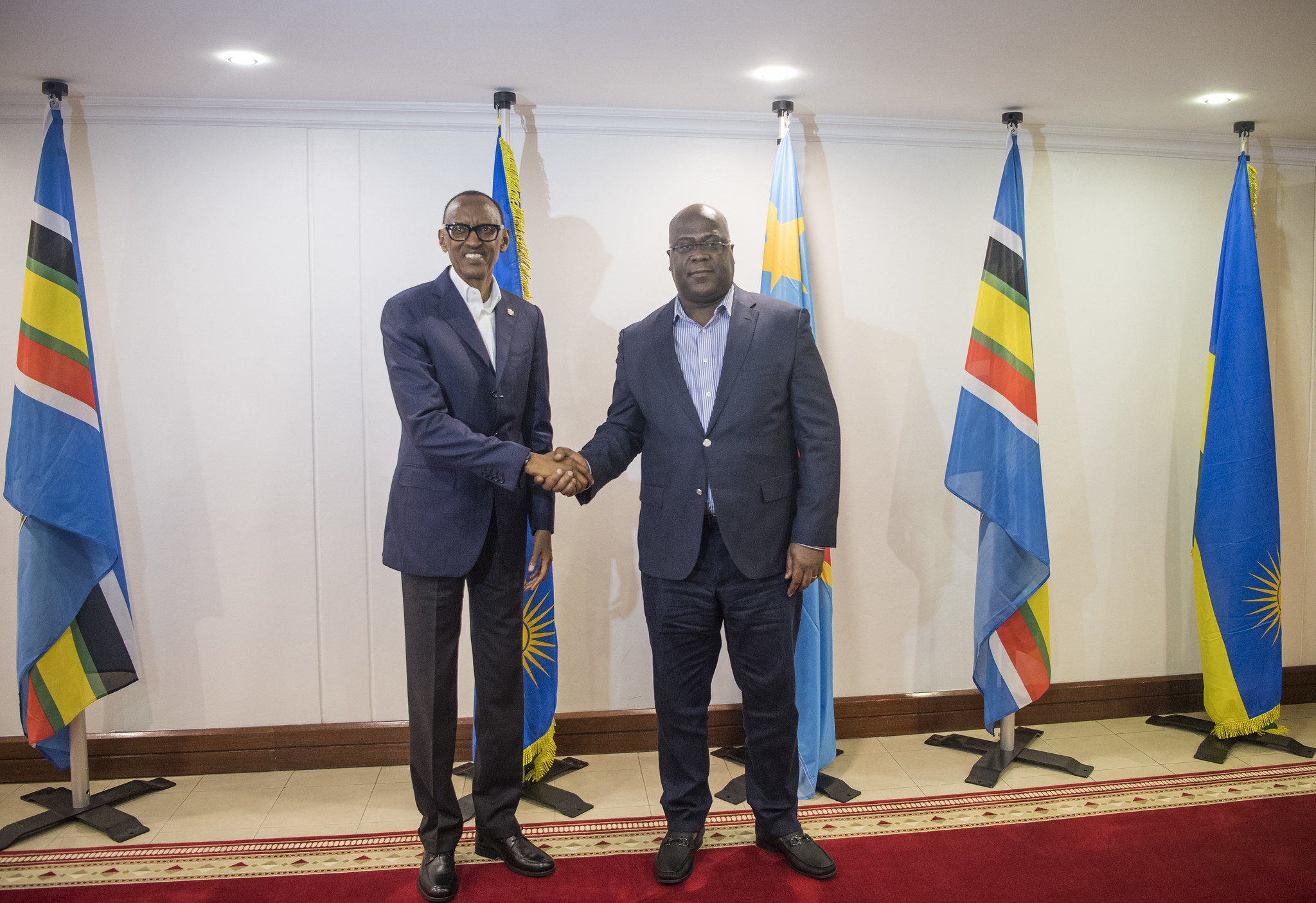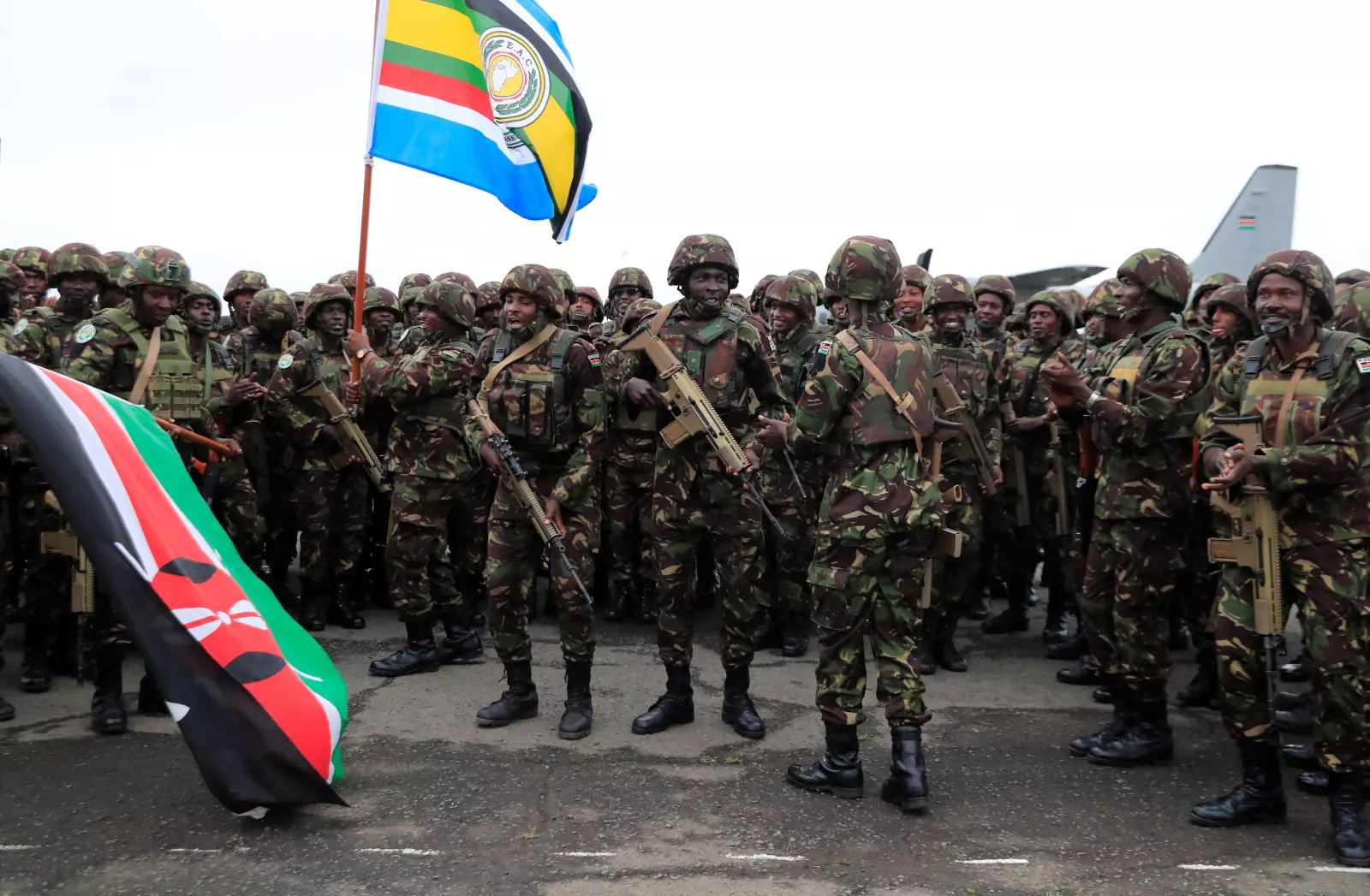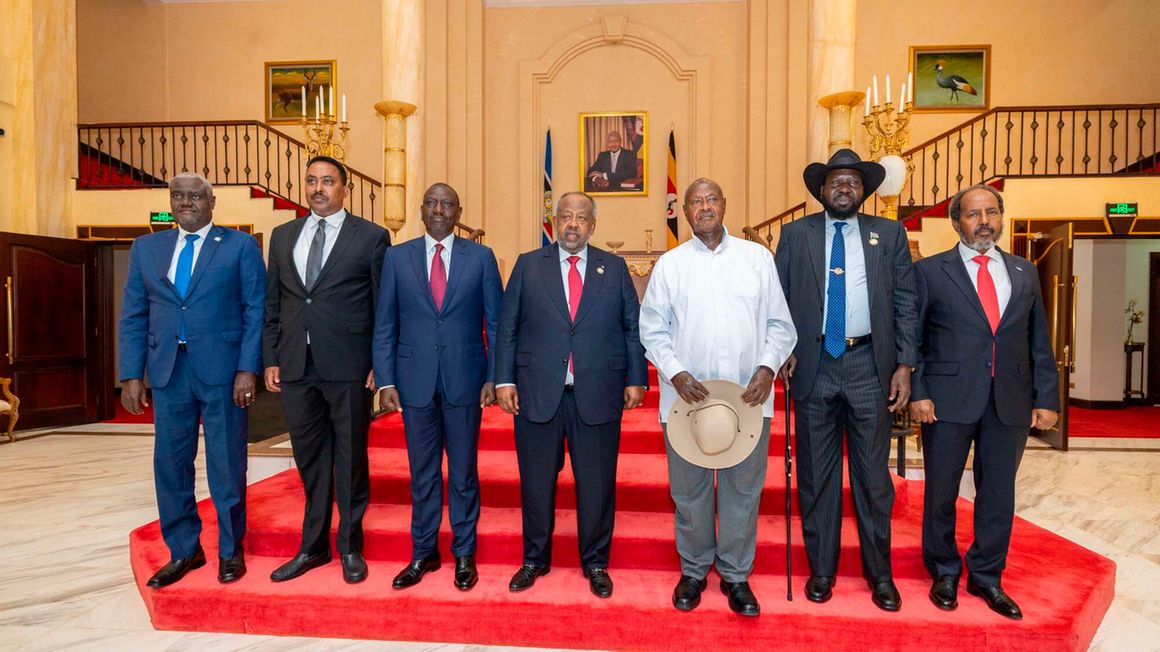In February 2024, the 37th Summit of the African Union concluded in Ethiopia’s Addis Ababa. The intracontinental discussion had evolved mostly around the current hot topic – the MoU between Ethiopia and Somaliland. Further topics, i.e. AU’s Peace Fund, the looming war in Sudan, and Africa’s role in world politics were addressed as well. However, much more was happening on the sidelines of this event. The Democratic Republic of Congo (DRC) and Rwanda found themselves, once again, in hot seats during a private discussion regarding the ongoing eruption of violence in the eastern provinces of the DRC.
The term “discussion” perhaps does not describe the situation most accurately. From what we have learned so far, Rwandan President Paul Kagame and his Congolese counterpart, Félix Tshisekedi did not, in fact, speak a word directly to each other, while exchanging several insults through other attendees. [1] This may seem ironic, given the fact that it is up to these two politicians to avoid yet another escalation in this regional crisis. Furthermore, it is Paul Kagame, who was tasked by the African Union to preside over the Committee on reforming the AU and its peace and security policies.

The end of the “Kagame Report Era”?
Building on prevailing inefficiency and underinvestment of the African Union, the AU Commission Assembly authorised Rwandan President Paul Kagame to prepare a detailed study on the AU reform preparations in 2016.
Kagame presented his Report on the Proposed Recommendations for the Institutional Reform of the African Union in 2017 [2], pointing out key problems behind AU’s deficiency and identifying crucial steps forward. Amongst others, the Report shed light on the issues of the AU’s Peace and Security Council (AUPSC), which “despite its strong legal framework and enhanced powers and functions,” … “did not meet the impact envisaged in the PSC Protocol”, especially in terms of decision-making, engagement, and impact (i.e. the situation in Libya after 2011 and managing the Islamist insurgencies in West Africa, in Nigeria in particular). Therefore, it recommended “a thorough reform of the Peace and Security Council,” which should include reviewing its membership and strengthening its working methods and role in prevention and crisis management.
Such an approach aligns with George Ayittey’s (Ghanian economist) saying “African solutions to African problems” from the early 1990s [3], and with the 2016 Kigali Financing Decision on funding the AU operations, envisaging limited external funding and improving accountability of the African countries.
In 2018, Paul Kagame entered the office of the African Union Commission (AUC) Chairman, hoping to be able to accelerate the change. However, the shadow of a slow implementation process and a bumpy road towards the desired dream has been appearing since the beginning, mostly connected to the impossible task of finding common ground among African leaders. Thus, in 2024, the African Union found itself at a stage, where only a minority of the targets were hit. During the 37th AU Summit, the Rwandan President handed over the responsible task of implementing the Kagame report to his Kenyan counterpart, President William Ruto. [4]
Not an Easy Task for Ruto
With this handover, President Ruto not only obtained the responsibility of implementing the institutional reform but inherently accepted the responsibility of finding a quick and efficient way of funding peace operations within the continent. And that is no easy task. Especially at a time when tensions on the Rwandan-Congolese border are growing in strength, the war in Sudan seems to be nowhere to its end, and Ethiopia and Somaliland are signing a widely contested Memorandum of Understanding. Nonetheless, all the conflicts are crucial for Kenyan security and stability of the neighbouring region and one can only hope that this will be sufficient motivation for Ruto to move forward.
Kenya already has some experience in managing regional stability. During the last couple of years, Kenya engaged in MONUSCO (from French Mission de l’Organisation des Nations Unies pour la stabilisation en République démocratique du Congo), led the mission deployed by the East African Community in Eastern DRC in November 2022 (East African Community Regional Forces, EACRF), hosted the Nairobi process peace-talks that same year, and aimed to pose itself as a mediator in the Sudan war which broke out in April 2023. However, the actual outcomes of the Kenyan efforts might be questionable.

Nairobi was replaced by Luanda in mediating the crisis between DRC and Rwanda, the EACRF withdrew from eastern DRC without any major success, and likewise, the MONUSCO troops started their slow withdrawal. [5] Furthermore, many actors tried to contribute to finding the solution to the Sudan war, but only a few managed to engage in some kind of talks with either side. Some of them even resulted in worsening regional relations, like the Intergovernmental Authority on Development (IGAD; which Kenya is part of) engagement, which led to Sudan suspending its membership in this East African organization.
This happened over the invitation of one of the warring factions, Mohamed Hamdan “Hemedti” Daglo, leader of the Rapid Support Forces, to an IGAD meeting in Kampala, Uganda, this January. The government of Sudan saw this step as “violating Sudan’s sovereignty”. [6] [7] Not a great example of successful peace talks. The only branch of mediation that seems to be viable nowadays is the renewed Jeddah talks led by the Saudis (with the paved way by the Egyptians), supported by the United States and its newly appointed envoy to Sudan, Tom Perriello. [8] Nonetheless, the Sudan war became an issue for countries outside of the imminent region and possibly even outside of the continent. And once again, the footprint of the African Union engagement is difficult to identify.

AU Takes Strong Stand in Rwanda-DRC Dispute
In March 2024, the African Union Peace and Security Council took a strong stand in solving the prevailing conflict between Rwanda, DRC and several rebel groups operating in the eastern DRC. The AUPSC declared its support, financial and logistical, to the Southern African Development Community Mission in DRC (SAMIDRC), deployed to the region originally in late December 2023, after the EACRF withdrawal. [9] Despite seemingly following the principles of the Kagame Report and Kigali Financing Decision, Rwanda is the main opponent of this step. It is so disturbed by it that it reached out not only to the AUPSC directly, but to the United Nations Security Council as well, raising concerns that the SADC involvement would further exacerbate the conflict. [9]
While one would welcome the strategy of African solutions, to African problems, the devil lies in the details. Or, in the parties supported by the SAMIDRC, in this case. South African, Malawian, Tanzanian and Burundian troops should (supposedly) support the troops of Forces Democratique de Liberation du Rwanda (FDLR), a militant group comprising of former Hutu siding with the génocidaires in 1994. [9] [10] In fact, the very existence of this group on Congolese soil lies in the heart of Rwandan justification for its involvement in DRC. Furthermore, Rwanda accused Burundi of harbouring the FDLR in an official letter to the AUC. [9] [11]
The question is whether the long-time desired decisive action by the AU will bring its fruits in this particular case. The Luanda talks between Rwanda and DRC representatives have met their stalemate, fighting in the Congolese North Kivu has been flaring once again since February 2024 [12] and the official endorsement of the SAMIDRC seems to create more division rather than finding common ground. Without a proper delivery of promised financial support of the AU as a whole and most importantly without the local population’s approval, it is doomed to fail, just like the previous missions.
Article reviewed by Stanislav Šturdík.
Sources
[1] Du Plessis, Carien. (2024, February 19). Open hostility between Rwanda and DRC at African Union summit. The Africa Report, retrieved from https://www.theafricareport.com/337556/open-hostility-between-rwanda-and-drc-at-african-union-summit/.
[2] Kagame, Paul. (2017, January 29). Report on the Proposed Recommendations for the Institutional Reform of the African Union. Retrieved from https://au.int/sites/default/files/pages/34915-file-report-20institutional20reform20of20the20au-2.pdf.
[3] IE. University. (2021, November 11). African Solutions to African Problems? IE. University, retrieved from https://www.ie.edu/blue-talks/african-solutions-to-african-problems/.
[4] Jeune Afrique. (2024, February 20). Frustrated Kagame hands AU reform over to Ruto. The Africa Report, retrieved from https://www.theafricareport.com/337642/frustrated-kagame-hands-au-reform-over-to-ruto/.
[5] AFP. (2023, December 3). East African regional force starts withdrawing from DRC. France 24, retrieved from https://www.france24.com/en/live-news/20231203-east-african-regional-force-begins-withdrawal-from-drc.
[6] AlJazeera. (2024, January 20). Sudan suspends membership in IGAD regional bloc. Al Jazeera, retrieved from https://www.aljazeera.com/news/2024/1/20/sudan-suspends-membership-in-igad-regional-bloc.
[7] AlJazeera. (2024, January 16). Sudan suspends contacts with IGAD mediating group: Foreign Ministry. Al Jazeera, retrieved from https://www.aljazeera.com/news/2024/1/16/sudan-suspends-contacts-with-igad-mediating-group-foreign-ministry.
[8] International Crisis Group. (2024, April 11). Sudan: A Year of War. International Crisis Group: Statement.Retrieved from: https://www.crisisgroup.org/africa/horn-africa/sudan/sudan-year-war.
[9] Mutambo, A. (2024, March 11). African Union to give logistics, financial aid to SADC troops in Congo. The East African, retrieved from https://www.theeastafrican.co.ke/tea/news/east-africa/african-union-logistics-financial-aid-to-sadc-troops-in-congo-4552370.
[10] Brown, O. T. (2024, March 13). AU to Fund SADC Mission in Democratic Republic of Congo. The Washington Informer, retrieved from https://www.washingtoninformer.com/african-union-sadc-military-mission-dr-congo/.
[11] Xinhua. (2024, March 5). Rwanda opposes AU support for SADC troops in Congo. The East African, retrieved from https://www.theeastafrican.co.ke/tea/news/east-africa/rwanda-opposes-au-support-for-sadc-troops-in-congo-4546368.
[12] Reuters. (2024, February 20). Explainer: Why fighting is flaring in eastern DRC, threatening regional stability. The East African, retrieved from https://www.theeastafrican.co.ke/tea/news/east-africa/explainer-why-fighting-is-flaring-in-eastern-drc-4530916.





